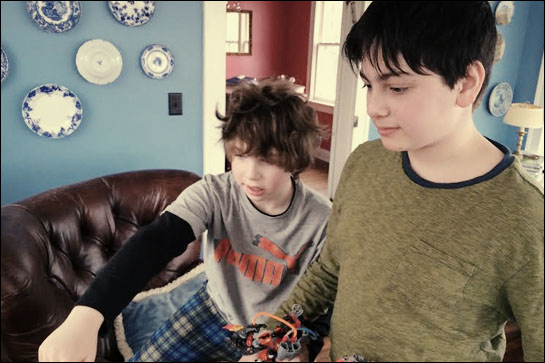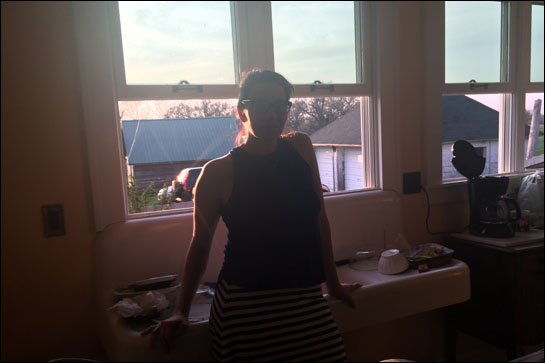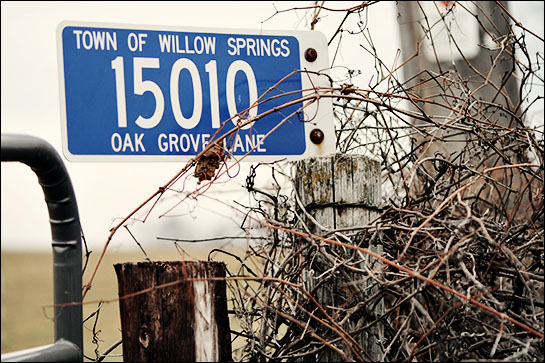
As a homeschooler, I knew college applications would be tricky. We started focusing on them completely at the beginning of the summer. And our interactions became more and more combustible until the final forms were due January 15. Read more

As a homeschooler, I knew college applications would be tricky. We started focusing on them completely at the beginning of the summer. And our interactions became more and more combustible until the final forms were due January 15. Read more

It’s difficult to enforce rules for kids because the more rules I choose to enforce the more work I make for myself. This is true with a six-year-old or sixteen-year-old. Read more

We cannot wave a wand and change society, or schools, or what I’m about to tell you, which is that elementary school teachers get no respect in our public school system and that explains the high attrition, high burnout, and hundreds of thousands of unfilled positions. Read more

Hindsight is so sucky. It was so much more fun to write about homeschooling when I was the deer-in-headlights parent who was so scared of making mistakes. In hindsight, I should have hired more people to give me advice. It’s so absurd that I didn’t. I notice that with things I’m great at — like managing my career, playing beach volleyball — I had no problem hiring lots of people to steer me. The idea of making even one wrong turn because of lack of guidance was so upsetting to me.
But as a homeschooler, I decided I could just read everything. I hired so few consultants. I think because I knew so little about it, I decided I could do it myself. This is a proven thing: we read more info about what we’re already good at. Like, if you are really good at productivity, then you read a lot about productivity. If you’re really good at nutrition, you read a lot about that. It’s not a chicken and egg thing, it’s an egg-chicken-egg-chicken-egg-chicken-egg thing. We just get stuck doing the stuff we’re good at and not doing stuff we’re not good at.
So it must also be proven — I’m proving it right now — that we hire consultants to help with what we’re good at. I think it’s because we can imagine what the help will be like. I understand what help with beach volleyball looks like. I can ask good questions and get good consultants. I was so lost with homeschooling that it was hard to even know who I could hire.
I see this with people who hire me for coaching. Everyone hires me for career coaching because they have had careers, and they understand how to ask career questions. But almost no one needs career coaching. (Right now I am about to kill my whole career coaching business, so if you were ever thinking of hiring me, go do that right now. Stop reading.)
Okay. So either you have a good career and people in your career are helping you, or you don’t have a good career and you should do something else. But it’s hard decide to not have a career, and it’s hard to know how to ask about that. So people just hire a career coach because that’s socially acceptable. This happens so often that I am shocked when someone genuinely needs career advice.
This is all to explain to you why I did not hire people to give me advice on how to homeschool. Well, I also didn’t want to hear the advice. Which, of course, is how people feel when I tell them they should just forget the whole career thing and focus on something else. We all hate realistic advice about an area where we are not high-achieving.
In hindsight, I should have hired a place that does college application consulting by starting really young and doing project-based learning with kids. But the projects are super-cool, memorable projects that go on college applications. Too often homeschoolers pat themselves on the back for project-based stupidity. We shouldn’t do that. Projects should have milestones and goals and hurdles, not just a fun way to pass time for parents. (Which is for another post, but really, so much of homeschooling is just so parents can do what they like. Myself included.)
Here are places that have great resources to hook your kids up with professors, professionals, experts who will help your kid become an expert and have something to show for it. And stop pretending you will learn right alongside your kid and become an expert. That’s not fair to your kid. Your kid should get to be with someone who knows more than you.
https://www.crimsoneducation.org/us/contact/
Go to that link and click on “Crimson Rise.” It will probably be really expensive. I’m sorry. I don’t know what to tell you. Homeschooling is expensive. But it’s not as expensive as private school. And it’s not as expensive as going to a mental institution from the drama of being in school-not-school, and on Zoom, and on not-Zoom, and teachers on strike, and not on strike etc.
Another place that has great resources for doing project-based learning:
https://ingeniusprep.com/
I know it seems weird to turn homeschooling into all college applications, all the time. But it makes sense when you look at the cost of really meaningful project-based learning: of course parents will only foot the bill for this when it’s related to college. Otherwise, parents aren’t used to paying to make education a great experience.
So really, this is my message: all the good homeschooling resources are project-based, and all the best project-based opportunities are with the college application consultants. The really big places, with a national or international presence, have many levels of support for a kid who wants to have deep, meaningful experiences before they leave home. The opportunities for these projects are narrow: between age 11, when a kid can handle it, and age 15, when a kid needs to start focusing on SATs.
So in hindsight, I regret not leveraging the resources these consultants offer during that period between 11 and 15. But there’s something comforting about regret: you can only pinpoint the things you regret if you feel like you did most of the other stuff in acceptable ways.

Today I sifted through drafts of posts I didn’t publish. This is from 2011. The picture up top caught my eye, so I read the post.
Last Friday I spent the day in bed. Well, first I got out of bed, had the kids do chores, and then made breakfast for the Farmer and the kids. But then I went back to bed. Read more

I started homeschooling because it seemed like a total waste of time to send my kids away from me to do something that wasn’t working anyway. I wanted my family to be about being together, day in and day out. Read more

Universities feel uncomfortable being a bastion for the rich and lucky. So colleges started screaming from rooftops (and courtrooms) about how admissions are based on subjective, hard-to-measure merit. But kids who are poor have much more difficulty displaying their merits, so colleges changed their language. Now colleges look at how kids have leveraged the resources they have. Read more

Two terrible parenting situations:
Clingy little kids follow you everywhere in the house and want to show you everything, and literally tug on your clothes if you stray.
Obstinate little kids loudly not doing what the teacher tells them to do at home – read a page, tie a shoe, draw a picture, anything that counts as stuff parents need to make kids do for school. Read more

So many homeschool parents say, “I can’t do math and I fit in fine.” But science has shown that’s probably not true.
It turns out that math, more than any other subject, is one that kids cannot learn on their own and often need more than just a parent’s help with for homework. This means that math homework has become a de facto marker for status among school kids: Who can finish it and who can’t? Who is consistent with the relentless pace, and who falls behind? Math is also a status marker for parents. More than any other subject, a child’s math achievement correlates to the socioeconomic status of the parents. Read more

We can learn about teaching grammar from Grammarly, I read this from a writing coach giving advice to high schoolers:
Grammarly rules. Get your parents to pay for the pro version and put everything you write until the end of time through it before you submit. I do!
What works about Grammarly is that it will ding you for the same mistakes over and over and over and over until you stop making them. A fascinating moment for me was putting another editor’s finished piece into Grammarly and seeing all sorts of error messages I’d never seen before. I hadn’t because I never made those mistakes. Grammarly shows you where your weaknesses as a writer are, so that you may then fix them.
Ironically, it’s much less useful for me now because I don’t make nearly the same number of errors. Now I mostly use it to finalize my work and double-check my copy editing. It still helps.
The reason Grammarly helps with copyediting is that it catches errors that Spellcheck misses. Grammarly can catch a misspelled word that actually spells another word because Grammarly can identify the eight parts of speech. So, for example, if you misspell assess and instead write asses, both are words, but Grammarly knows there should be a verb in that spot and not a noun, so you’ll get an error message.
This post is not sponsored by Grammarly. In fact, it’s the opposite. It’s an homage to Grammarly. They have a huge presence in Ukraine. Well, they did, before Russia started bombing the hell out of Ukraine. Now Grammarly has a huge presence in the Ukraine army; the company is continuing to pay all employees whether they are fighting, or evacuating, or hiding in the subway. That’s amazing. If I hadn’t downloaded Grammarly I’d download it now just to show support.
It makes sense to me that you can learn grammar from error messages because I learned how to build spreadsheets from error messages. If you use Excel, every time there’s an error Excel shows you why there seems to be an error. You can decide to override the error or not, but Excel teaches you the right way to build a financial model. You can learn to think about your spreadsheet the way Excel thinks about it.
I’m fascinated by how much we can learn from a computer if we stick with the software. It’s like having a relationship with a great teacher in that you start to think the way that teacher thinks, and it’s not dogma so much as learning all the rules so you can decide yourself which you should break.
When I wrote regularly for mainstream media sites, they had software that would suggest advertisements as I was writing. For example, I typed The best resumes are not a list but rather a story. Then the software suggested a resume writer to link to and the site would make money for linking to that person. Of course I responded to that prompt by linking to myself as a recommended resume writer. But there were many other instances where the software recommend linking, and I got better and better at thinking about paid links. After writing in that software I developed an intuition for when to drop paid links, and I still do it now.
Which is how I know that telling you Grammarly did not sponsor this post is breaking a rule. I should have put Grammarly in the headline even though they didn’t sponsor the post. Then Grammarly’s competitor will worry about missing out and they will contact me about sponsorship.
You couldn’t have learned that from software. Which is why I am sure we don’t have to worry about software taking over our jobs. We just have to worry about learning more about the topic than software can learn. So teachers need to do more than learn rules. Kids can learn the rules just fine on their own. The job of teachers is to help the kids apply the rules in innovative ways.
But there’s an inverse relationship to grades and innovation. When you’re trying to figure out if your kid’s school is good, ask yourself if the school hires people who teach the rules or the schools hires people with a track record for breaking them.
penelope@penelopetrunk.com
